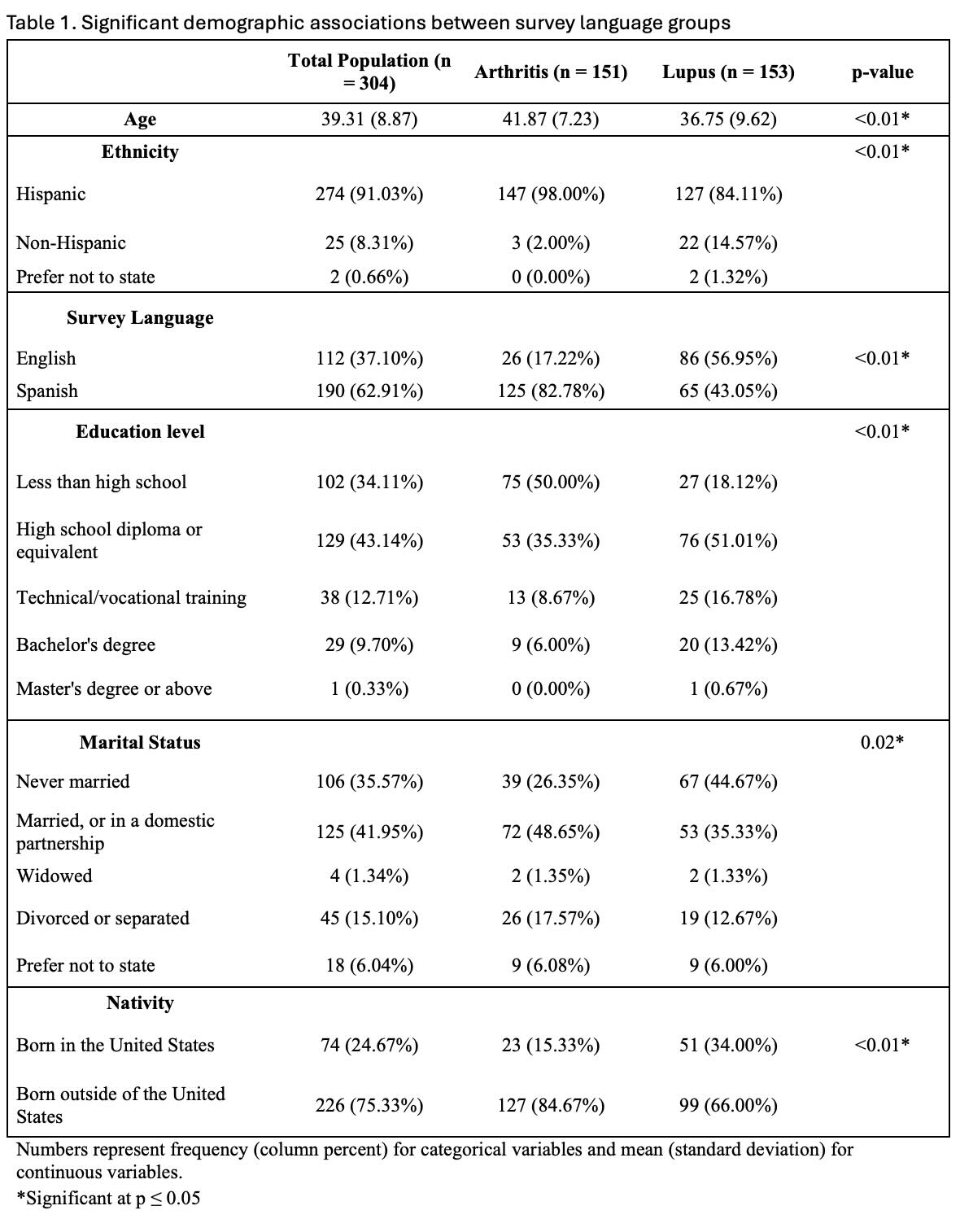Session Information
Date: Tuesday, October 28, 2025
Title: (2195–2226) Reproductive Issues in Rheumatic Disorders Posters
Session Type: Poster Session C
Session Time: 10:30AM-12:30PM
Background/Purpose: Reproductive-age Hispanic women with rheumatoid arthritis, juvenile idiopathic arthritis (combined, inflammatory arthritis; IA), and systemic lupus erythematosus (SLE) often bear a higher disease burden and experience worse outcomes compared to other populations. In addition, careful attention must be given to appropriate medication use and contraception use during childbearing years. While the 2020 ACR Reproductive Health Guideline provides recommendations for contraception counseling, little is known about how these are experienced by patients in under-resourced settings. We examined patient-reported experiences with reproductive health counseling and contraceptive practices in an urban safety-net clinic.
Methods: An anonymous survey was administered to 304 women (aged 18–50) with SLE or IA at Los Angeles General Medical Center, a public hospital serving a predominantly Hispanic, state-insured population in urban east Los Angeles. The survey was based on topics from the 2020 ACR Guideline for the Management of Reproductive Health in Rheumatic and Musculoskeletal Diseases, and was administered in English or Spanish. Multivariable logistic regression was used to assess factors associated with receiving contraception counseling and patients’ perceptions of their physicians’ reproductive health knowledge.
Results: Most respondents (91%) identified as Hispanic, and 63% completed the survey in Spanish (Table 1). Only 51% reported receiving contraception counseling in the past year. English-speaking participants had significantlyhigherodds of receiving such counseling compared to Spanish speakers (OR 3.93; 95% CI 1.82-8.51; p < 0.01) (Table 2). Spanish-speaking individuals wereless likelyto perceive their physician as knowledgeable about reproductive health (OR 0.46; 95% CI 0.22-0.95; p=0.04) (Table 3). Furthermore, each additional year in age was associated with a 4%lower odds of reporting contraception counseling in the past year (OR: 0.96; 95% CI 0.92-0.99; p=0.02), as well as a 5%lower odds of confidence in their rheumatologist’s knowledge to address reproductive health and rheumatic disease (OR 0.95; 95% CI 0.91-0.99; p < 0.01) (Table 2, Table 3). Among sexually active patients on teratogenic medications who were not trying to conceive, those who received contraception counseling had increased odds of using long-acting reversible contraception (OR 5.69; 95% CI 1.38-23.48; p=0.02). Notably, 27% of these patients reported no contraceptive use.
Conclusion: Spanish-speaking and older patients with SLE or IA were significantly less likely to receive reproductive health counseling or feel confident in their rheumatologist’s ability to address the intersection of reproductive health and rheumatic disease. However, counseling was strongly associated with the use of highly effective contraception for patients on teratogenic medications. These findings underscore the importance of integrating proactive and culturally informed reproductive health counseling into the rheumatology clinic to improve patient safety and equity.
 Table 1. Significant demographic associations between survey language groups
Table 1. Significant demographic associations between survey language groups
.jpg) Table 2. Multivariable analysis of factors influencing patient-reported contraception counseling
Table 2. Multivariable analysis of factors influencing patient-reported contraception counseling
.jpg) Table 3. Multivariable analysis of influences on patient-reported perception of physician knowledge on reproductive health and rheumatic disease
Table 3. Multivariable analysis of influences on patient-reported perception of physician knowledge on reproductive health and rheumatic disease
To cite this abstract in AMA style:
Alhassan E, Kobashigawa L, Ramos V, Rodman J, Wise L. Disparities in Reproductive Health Counseling Among Hispanic Women with Autoimmune Rheumatic Diseases: Insights from a Patient-Reported Survey in an Urban Safety-Net Setting [abstract]. Arthritis Rheumatol. 2025; 77 (suppl 9). https://acrabstracts.org/abstract/disparities-in-reproductive-health-counseling-among-hispanic-women-with-autoimmune-rheumatic-diseases-insights-from-a-patient-reported-survey-in-an-urban-safety-net-setting/. Accessed .« Back to ACR Convergence 2025
ACR Meeting Abstracts - https://acrabstracts.org/abstract/disparities-in-reproductive-health-counseling-among-hispanic-women-with-autoimmune-rheumatic-diseases-insights-from-a-patient-reported-survey-in-an-urban-safety-net-setting/
